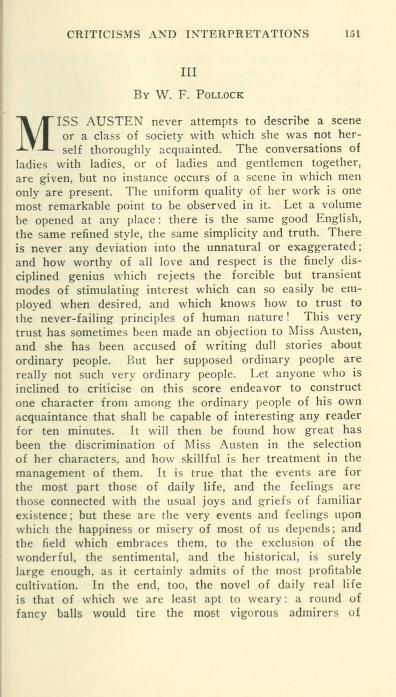 ............prev...................v?....................next
............prev...................v?....................next {{prhprp151.jpg}}
Miss Austen never attempts to describe a scene
or a class of society with which she was not her-
self thoroughly acquainted. The conversations of
ladies with ladies, or of ladies and gentlemen together,
are given, but no instance occurs of a scene in which men
only are present. The uniform quality of her work is one
most remarkable point to be observed in it. Let a volume
be opened at any place: there is the same good English,
the same refined style, the same simplicity and truth. There
is never any deviation into the unnatural or exaggerated;
and how worthy of all love and respect is the finely dis-
ciplined genius which rejects the forcible but transient
modes of stimulating interest which can so easily be em-
ployed when desired, and which knows how to trust to
the never-failing principles of human nature! This very
trust has sometimes been made an objection to Miss Austen,
and she has been accused of writing dull stories about
ordinary people. But her supposed ordinary people are
really not such very ordinary people. Let anyone who is
inclined to criticise on this score endeavor to construct
one character from among the ordinary people of his own
acquaintance that shall be capable of interesting any reader
for ten minutes. It will then be found how great has
been the discrimination of Miss Austen in the selection
of her characters, and how skillful is her treatment in the
management of them. It is true that the events are for
the most part those of daily life, and the feelings are
those connected with the usual joys and griefs of familiar
existence; but these are the very events and feelings upon
which the happiness or misery of most of us depends; and
the field which embraces them, to the exclusion of the
wonderful, the sentimental, and the historical, is surely
large enough, as it certainly admits of the most profitable
cultivation. In the end, too, the novel of daily real life
is that of which we are least apt to weary: a round of
fancy balls would tire the most vigorous admirers of
[151]............prev.....................next................